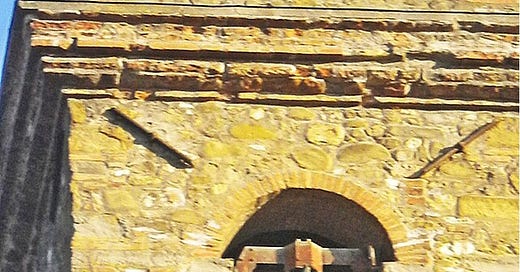The Bell Tower
Among so many unique and evocative words in Italian, campanilismo is one of the best. The definition of the word is usually given as loyalty to, and pride in, one's home town, and it comes from the word campanile, where the campana hangs.
Consider what the bell tower meant in small Italian towns, both symbolically and practically. It was usually the tallest structure in a town, connected of course to the church, the center of civic life. Its bell tolled the hours, was rung to warn of danger, and chimed to mark great events. The tower might be what you would see first when approaching the town, and its bell could be heard from miles away. If you lived within hearing distance of that bell, that was your community, the place you went for shopping and socializing, to get the latest news, to attend weddings, baptisms and funerals,
Even if many of those functions are taken care of by what we call modern conveniences, and despite today's mobility, campanilismo is alive and well in Italy.
I remember a courtesy call I made once on the editor of La Nazione, Florence's main newspaper. In the initial small talk I asked if he was from Florence originally, and he said he was born in Prato. Since Prato is now a virtual suburb of the Tuscan capital I said something about it being the same thing. No, he answered, wagging a finger, I am from Prato. It was not my finest moment as a diplomat, and it brought home to me how important roots are to Italians, more so than for Americans. With the possible exception of Italian-Americans.
As I found when we moved here to Pueblo, Colorado, campanilismo can extend beyond Italy. We have a large Italian-American community, and it seems like half its members come from one small town in the hard-scrabble hills of Sicily, Lucca Sicula. It is not uncommon for Puebloans to travel there, even if the connection is second or third generation. Something draws them back to their roots.
In that regard I recall a lunch I had in Rome with a good friend who was a journalist with L'Espresso, the Italian news magazine. It was just about the time I was leaving to go into retirement, so the conversation naturally went to that topic. I told him my wife and I had decided to retire in New Mexico, a place we had only visited once, and where we knew not a single person. He found that astounding. When he retired, he would be moving to the small town in the Abruzzi where he had been born and grew up. He would play cards and argue about politics with the other retirees, many of whom he'll have known since childhood. That was the Italian way, he said.
It was likely this lunch that years later influenced an important character in my first book, Cold Tuscan Stone. Commissario Conti, who has a conflicted relationship with my protagonist Rick Montoya, is getting close to retirement and thinks frequently of his return to his native town in southern Italy to play bocce. Now that I think about it, those bocce courts were probably in the shadow of the town's campanile.
The tease My next post will fall on August 15th, Ferragosto, which is the most sacred of Italian holidays. So I'll probably write about it.




